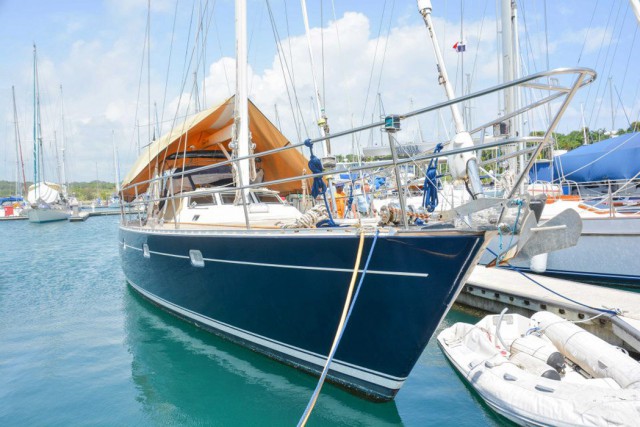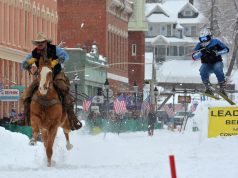
The country of Panama has faded from the American imagination.
Meeting the challenge of constructing a passage that would link two oceans and bisect the tendon of land that bridged two continents once generated intense civic pride, especially in 1914 when America was emerging as a major world player. The ambitious canal was completed that year, prior to the onset of World War I. The engineering marvel remains a vital shipping route, though longstanding American glamor associated with the Panama Canal waned when control was handed over to the Panamanian government in 1999.
American forces invaded Panama in 1989 under orders from President George H.W. Bush. Operation Just Cause was the largest U.S. military intervention since the Vietnam War. Under the veil of promoting global democracy, the true impetus of the invasion was securing safe passage through the Panama Canal. The capture of military dictator Manuel Antonio Noriega toppled a regime that was deemed to be fueled by illicit drug trafficking and typical strongman violence against the people. Noriega lives on to this day, incarcerated in Panama, though his celebrity is also nearly forgotten.
What Panama has become since its divorce from the forefront of American consciousness is a difficult and complicated study. Economically, the country has boomed, by Central American standards, bolstered by tolls harvested from use of the canal. Panama politically is a democratic republic. Following the 1989 invasion, a sequence of freely elected leaders have dragged democracy into existence. With the economy fueled by full ownership of the canal, Panama refined itself as an upscale, developing nation. Throughout the mid-2000s, Panama competed with Costa Rica as the perfect low-budget, high-standard-of-living tropical paradise for ex-pats. One of those drawn in by its allure was Bob Ehlert.
But the texture of Panama is changing once again, and as it shifts, an increasing number of reports of foreigners missing or murdered have been coming from the country. And in June, Bob Ehlert stopped returning calls and emails.
Living the dream
For the past 10 years, Robert “Bob” C. Ehlert, 71, split time living in Minnesota and his condo in Panama City. The retired Vietnam veteran is an accomplished sailor whose outgoing, gregarious personality made him many friends in his adopted country. Ehlert discovered the charms of Panama while traveling through Central America. Not only were the people friendly and the landscapes gorgeous, Panama offered a safe place to harbor his boat. Unlike many foreigners who seek out the secluded sections of Panama, Ehlert wanted to be part of the local community and thus made the decision to live in Panama City, even though this meant a two-hour drive to the harbor where his boat was anchored.
Ehlert spent a portion of each year in Panama for the last decade before disappearing on June 21. | Photo courtesy of Mariah Ehlert
Ex-pats from around the world have been drawn to Panama for its inexpensive luxury and promising trend towards First-World sophistication. Couple that with enchanting jungles and pristine, white sand beaches and a picture emerges of an ideal sanctuary far from the buzzing, fast-paced chaos of American life. Tourism flourished in the early 2000s as crime rates dropped and investors funded development of hotels, restaurants and resorts.
Panama’s upward momentum took a major hit as the world economy foundered in the mid 2000s and the ugly relics of an unsettled past began to reemerge. Drug trafficking once again reared its ugly head, setting off waves of violence that the weakened government could not decisively combat. Corruption oozed into all manner of politics, and at present, the identity of the nation rests on shaky pillars. At odds with this declining reality is the hard-won reputation as a tourist-friendly destination that the post-1989 invasion reform brought about. The dangerous confluence of a country slipping into violence paired with glowing yet inaccurate endorsements from numerous respected travel publications has set the stage for catastrophe.
A mysterious disappearance
On June 21, a pair of friends staying with Ehlert at his Panama City condo returned to find him absent. Left behind was a note explaining that he had gone for two weeks with a friend known as “Diane” to examine potential real estate in an area of the Bocas del Toro, a collection of islands. His boat was docked at Shelter Bay Marina.
The friends didn’t think much of it and life went on. It wasn’t until the absence became more pronounced that a concerned friend in Panama got in touch with Ehlert’s daughter Mariah Ehlert, a Denver resident.
“Initially, I contacted the U.S. Coast Guard thinking he may be lost at sea and his friends in Panama that I had contact information for and started researching for others,” Mariah Ehlert says. “Then the U.S. Embassy and the police in Minnesota where he lives the other part of the year. I then quickly discovered we had to contact senators, Senate Foreign Relations Committee to get the Legal Attaché in Panama [a.k.a. the FBI overseas] involved. I launched a campaign among friends and family to contact local states.”
The note was quickly sussed out as a forgery by family members — the handwriting was clearly not Bob Ehlert’s. While his boat remained in harbor, his car was missing, and as of press time, has not been recovered. No activity has been recorded on his bank account and nothing in his condo was stolen. As each day passed, Bob Ehlert’s disappearance became more likely the result of nefarious intentions — kidnapping, violent crime or murder. After doing all she could from her home base in Colorado, Mariah Ehlert made a personal visit to Panama in July to aid in the investigation of her father’s disappearance.
“The Panamanian police have very little resources and even less motivation to go looking for Americans,” she says. “They are much more occupied with drug runners. They can’t really put out an APB like we can to search for a car or person. The police outside of Panama City are barely trained, much less savvy in investigative work. … We were able to check out his apartment, see computer logs, check out the marina and his boat, talk to all the people in between, talk to a few more of his friends there. Get a clearer picture of the story. Basically, it left me with more questions than answers.”
“I am exhausted,” says Ehlert. “All the different aspects of this, lawyers, accounts, bills, FBI, police, countless calls, emails, messages from his friends and mine wanting something. Add in the emotional element and reality of what is happening, it’s draining and painful. I am tired and I am sad.”
Bob and Mariah Ehlert, who has pressured Congress to continue the search for her father. | Photo courtesy of Mariah Ehlert
“Panama was particularly difficult. Searching his condo and boat, looking for information, was difficult, frightening and sad. I realized that this could be it, all that is left of him, at the same time I completely expected him to walk through the front door. It was a roller coaster of emotions, still is. The reality of him going missing hits me hard.”
Despite the unreliable and underpowered Panamanian resources, Mariah Ehlert says several U.S. senators have been helpful in getting resources allocated for the search.
“Amy Klobuchar [D-Minnesota], by far has been the most responsive and active. Her office was immediately sympathetic and responsive. Senator [Mark] Udall [D-Colorado] was fast-acting as well,” she says. “[Michael] Bennett’s [D-Colorado] office, however, not so much. After some prodding they finally returned my calls and were much more interested in what the other senators had done versus what I needed done.”
The problem is that foreign diplomatic investigations have limited reach. Even when mobilized, U.S. agencies can only investigate within the parameters of their diplomatic entitlements and are left collaborating with the overwhelmed local Panamanian authorities. Many families of missing foreigners turn to private investigators, as did the Ehlert family.
Troubling trend
Violence against foreigners in Panama has risen dramatically in the past five years, and the crimes committed have been much more egregious than simple muggings and robberies. In March, the body of 68-year-old Ed Moynan was discovered in a park near Coronado, Panama. Moynan was a successful businessman from Canada who had retired to a gated community in the small seaside village. On Aug. 21, remains found in Panama were linked with American Yvonne Baldelli, a 42-year-old woman from San Diego who went missing in 2011 from Bocas del Toro (the same place the faux note said Ehlert was headed to). In January 2012 two American ex-pat brothers, 36-year-old Ian Escay and 24-year-old Uan Escay, were gunned down in Panama City. In 2011, two foreigners, a American man and a French woman, were murdered by Spaniard Javier Martin in Panama.
Not all crimes against foreigners are directly related to the flourishing drug trade, but the criminal activity has stretched local police to their limits. Outlying areas of the country have become more lawless and dangerous for tourists, ex-pats and part-time citizens like Bob Ehlert. In the cases of Baldelli and North, the main suspects in their cases are foreigners acting within Panama’s borders. If this trend continues, Panama’s once idealistic retreats may be transformed from lazy, peaceful sanctuaries to havens for criminals of all nationalities.
How to help
After two months of investigating, Bob Ehlert remains a missing person. Mariah Ehlert continues her efforts to find her father and has started a fundraising site (http://www.gofundme.com/findbob) to help hire a private investigator and to fund future investigative trips to Panama.
How else can people help?
“Fundraising, yes, but also spreading the word,” Mariah Ehlert says. “Contacting local senators, especially members of the foreign relations committee, is very helpful to keep the pressure on and keep the search going. Also spreading the word to anyone in Panama or with connections in
Panama. His car still hasn’t been found. The road to Bocas del Toro is a
very small and poorly maintained — he could be lost in a ditch.”
Despite the grave implications of her father’s absence, Mariah Ehlert retains an optimistic outlook on the situation, a trait she shares with the elder Ehlert.
“I’ve learned that this isn’t anything new in that area of the world. It’s so heartbreaking and difficult to process and go through. There aren’t really any support groups for this sort of thing. But one good thing that has come of all this is that I’ve learned how absolutely wonderful my friends and family are, and that even strangers have been eager to help. I am so fortunate to know so many spectacular humans. I couldn’t ask for a better support system.”
For updates on Bob Ehlert’s case, visit the Missing Americans website: http://missingamericans.ning.com.














